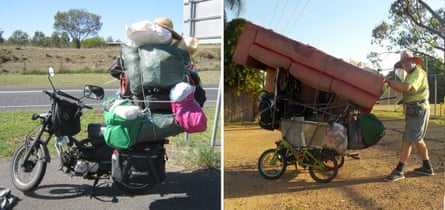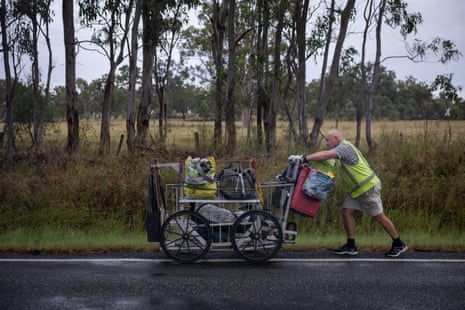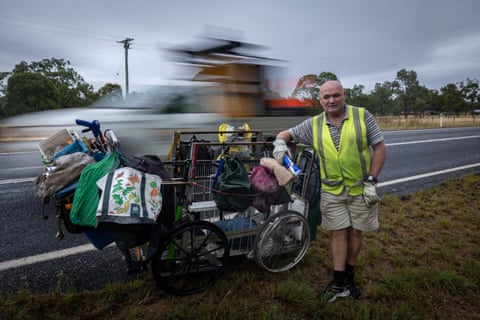Every few years Leonard Monaghan finds a refrigerator full of rotting meat and vegetables on the side of a country road in south-east Queensland.
He suspects the culprits must return from holidays to a broken fridge and bad smell. Instead of paying $12 to drop it off at the local tip, they dump the whole lot on the quiet backroad.
Monaghan, who styles himself as the “Warwick Rubbish Rambler”, has gathered 104 tonnes of rubbish from roadsides around the rural town in the past 15 years.
Other standout finds include dozens of mobile phones of which six were returned to their owners, a sex swing, a sealed 24-pack of deodorant cans and a plastic bag full of pornographic DVDs.
“St Vincent’s [charity shop] doesn’t have an X-rated section, at least not that I know of, so the DVDs went in the bin,” he says.
The disability pensioner spends at least 20 hours a week collecting rubbish.

His days start early to avoid the heat. I met him at a turnoff 15km north-west of Warwick at 5.30am on Monday for a 17km stomp along a narrow road. He targets this stretch of road, which is surrounded by long grass and scrub, one day a month.
“I guess you can say I’m a bit obsessed,” he says. “Obsession isn’t necessarily a bad thing I think, if it gives you a good purpose.”
His rubbish collecting began in 2007 as a daily morning walk, after years of illness. He was aiming to get fit and picked up rubbish along the way. A year later he’d collected one tonne of rubbish.
Early on he experimented with using a postie bike – the low-powered motorcycles favoured by Australia Post – to speed up rubbish collection. That “fun but impractical and inherently dangerous” approach lasted a few years, until he collided with a dead kangaroo.

He now favours a custom-built trolley, which rolls out of the back of a large navy-blue van. This setup has taken his rubbish rambling “to a whole new level”.
His latest personal milestone, 104 tonnes of rubbish collected since 2008, passed on Saturday. By 2032 he hopes to crack 200 tonnes, which will mean collecting 30kg of trash a day for the next eight years.
Monday’s haul is mostly cans, plastic bottles, plastic wrappers and a few cigarette packets flung out the windows of passing cars. It weighs in at just 13kg. “Well below my target,” he says.
Cans and bottles are taken to drop-off points for the 10c refund and car batteries are sold to a local metal dealer for 50c/kg. Anything else that doesn’t fit in his rubbish and recycling wheelie bins (the local council gave him an extra set) goes to the tip.
In 2023 he was named Cultural Person of the Year by the Southern Downs regional council. He received a citizen award in 2018.
“I think they wanted to give me another award so they had to make one up,” Monaghan says. “In what way am I cultural?
“It’s good to be recognised, but it means more to me when people toot the horn on the way past, wave, or give out one of those ‘Gooodoonnyaaas’, especially when it’s raining.”

Southern Downs council has employed an illegal dumping officer since July. Nicole Collett, the council’s manager of environmental services, says 574 wheelie bins worth of illegally dumped rubbish have been recorded in the past seven months.
Dropping household rubbish at the tip is free, Collett says, but “a lot of the time people leave a rental and then dump all their furniture on the side of the road”.
Due to recycling costs, residents are charged a small fee to dispose of car tyres, fridges and mattresses. Monaghan doesn’t bother collecting those items. He often walks past more than a dozen tyres a day, and says a refund system should apply to used car tyres like it does to bottles and cans.
“Queensland University [of Technology] is looking at turning them into diesel,” he says. “But it’s not economical I guess. There’s no incentive.”

He’s also noticed an uptick in the number of mattresses dumped on roadsides since the tip introduced the $15 mattress disposal charge last year.
In contrast, the number of aluminium cans and drink bottles has dropped since the 10c container deposit scheme was introduced in Queensland in 2018.
According to the Queensland environment department, local governments in the state spent a combined $25m cleaning up 11,723 tonnes of litter and illegally dumped waste in the 2022-23 financial year.
“I would appreciate it if people didn’t dump things. It would make things easier and I’d be happy for it,” Monaghan says.
“Then again, it gives me something to do, I suppose.”
